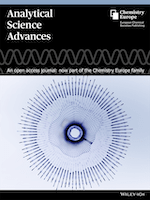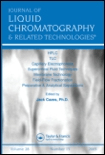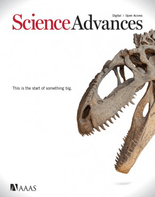
LCGC North America
Scope & Guideline
Fostering Discussion and Advancing Analytical Practices
Introduction
Aims and Scopes
- Analytical Chemistry and Separation Science:
The journal covers a broad range of topics related to analytical chemistry, with a strong emphasis on chromatography techniques, including liquid chromatography (LC), gas chromatography (GC), and their hybrid techniques. - Method Development and Optimization:
A core focus is on the development and optimization of analytical methods, including troubleshooting and enhancing performance in chromatography and mass spectrometry. - Emerging Technologies and Trends:
The journal highlights emerging technologies and trends in the field of chromatography, including automation, chemometrics, and machine learning applications in analytical methods. - Environmental and Food Safety Applications:
Research and discussions surrounding the application of chromatography and analytical techniques in environmental monitoring and food safety are also prominent, reflecting current global concerns. - Biopharmaceutical Analysis:
The journal provides insights into the analysis and characterization of biopharmaceuticals, focusing on techniques relevant to the pharmaceutical industry, including method validation and regulatory compliance.
Trending and Emerging
- Automation and Digital Transformation:
A growing trend is the integration of automation and digital technologies in laboratory workflows, enhancing efficiency and data management in analytical processes. - Sustainability and Green Chemistry:
There is an increasing focus on sustainability within analytical chemistry, with topics exploring green chemistry principles and environmentally friendly practices in chromatography. - Advanced Characterization Techniques for Biopharmaceuticals:
The analysis and characterization of biopharmaceuticals are expanding, with emerging methodologies that address the complexities of modern drug development processes. - Multi-Attribute Methods (MAM):
The adoption of multi-attribute methods for the characterization of complex biopharmaceuticals is gaining momentum, reflecting industry needs for comprehensive quality control. - Microplastics and Environmental Contaminants:
Research on microplastics and other emerging environmental contaminants is becoming more prominent, addressing urgent global environmental issues.
Declining or Waning
- Traditional Sample Preparation Techniques:
There has been a noticeable decrease in publications focused on traditional sample preparation methods, as newer, more efficient techniques gain traction. - Basic Chromatography Fundamentals:
The coverage of basic chromatography fundamentals seems to be waning, likely due to the audience's increasing familiarity with foundational concepts and a shift toward more advanced applications. - General Instrumentation Reviews:
There are fewer articles solely dedicated to reviews of chromatography instrumentation, as the journal seems to prioritize innovative applications and methodologies over general discussions.
Similar Journals

CHROMATOGRAPHIA
Unraveling Complexities through ChromatographyCHROMATOGRAPHIA is a renowned scholarly journal published by Springer Heidelberg, specializing in the field of analytical chemistry, biochemistry, and organic chemistry since its inception in 1968. With its ISSN 0009-5893 and E-ISSN 1612-1112, the journal has maintained a robust profile, currently ranking in the Q3 and Q4 quartiles within significant Chemistry categories. Aimed at researchers, professionals, and students, CHROMATOGRAPHIA serves as a critical platform for disseminating innovative research, methodologies, and advancements related to chromatography and its applications in various scientific fields. While the journal is not open access, it offers significant visibility and scholarly contribution opportunities, making it an essential resource for those engaged in the vibrant intersection of chemistry and biochemistry.

Analytical Science Advances
Leading the Charge in Analytical Method DevelopmentAnalytical Science Advances is a dynamic journal published by WILEY, dedicated to the ever-evolving field of analytical chemistry. With an ISSN of 2628-5452, this open-access platform aims to disseminate high-quality research and insightful reviews that push the boundaries of analytical methodologies and instrumentation. Since its inception in 2020, the journal has gained traction, securing a commendable Q2 ranking in 2023 within its category, highlighting its significance in the scientific community. Currently positioned at Rank #68 out of 156 in Scopus' analytical chemistry category, it boasts a 56th percentile ranking, reflecting its contributions to advancing analytical techniques. Researchers, professionals, and students will find this journal an invaluable resource for keeping abreast of the latest developments, emerging technologies, and innovative approaches in analytical science, ensuring the journal's relevancy and influence in shaping future discoveries.

MICROCHEMICAL JOURNAL
Illuminating the Path of Spectroscopic DiscoveriesMicrochemical Journal, published by Elsevier, stands as a leading scholarly publication in the fields of Analytical Chemistry and Spectroscopy, boasting impressive rankings of Q1 and Q2 in their respective categories for 2023. With an H-index reflecting its substantial impact and relevance, this journal has been a cornerstone of research dissemination since its inception in 1957, and it continues to play a vital role in advancing the methodological and technological innovations within these disciplines. The journal presents peer-reviewed articles that explore a wide array of topics, making it an essential resource for researchers, professionals, and students keen on the latest advancements in microchemical processes and techniques. Although it does not currently offer open access options, its publication through Elsevier ensures a high standard of academic integrity and wide accessibility through various academic institutions. With a strong Scopus ranking—9th in Chemistry Spectroscopy and 22nd in Analytical Chemistry—Microchemical Journal is an indispensable platform for empirical studies, insightful reviews, and pioneering methodologies in the microchemical domain.

LCGC EUROPE
Innovating analytical chemistry through peer-reviewed insights.LCGC EUROPE is a prominent journal dedicated to the field of analytical chemistry, specifically highlighting the latest trends and innovations in chromatographic techniques. Published by MJH Life Sciences, this journal has served as a valuable resource for researchers, professionals, and students interested in the nuances of laboratory practices and the advancement of instrumentation. Although LCGC EUROPE ceased its coverage in Scopus from 2018, it has maintained a significant influence within the community, evidenced by its Scopus rank of 90/114 in Analytical Chemistry, placing it in the 21st percentile. With its inception dating back to 1996, the journal provided essential insights and peer-reviewed articles, fostering a rich understanding of chromatographic science. While the journal is not currently open access, it remains an integral part of the literature for anyone engaged in the analytical chemistry landscape, especially as it pertains to laboratory methodologies and innovations.

Journal of Analysis and Testing
Transforming knowledge into impactful analytical practices.Journal of Analysis and Testing is a premier academic journal published by SPRINGER SINGAPORE PTE LTD, dedicated to advancing the fields of analytical and environmental chemistry. With ISSN 2096-241X and E-ISSN 2509-4696, the journal has established a significant presence since its inception in 2017, converging its focus until 2024. The journal's outstanding rankings in 2023, including Q1 quartile placements in Analytical Chemistry, Instrumentation, and Spectroscopy, underscore its pivotal role in disseminating high-quality research. Researchers can access cutting-edge studies that explore innovative testing methodologies, electrochemical analyses, and material evaluations, making it an essential resource for professionals and students alike. The Journal of Analysis and Testing not only celebrates advances in science and technology but also promotes interdisciplinary collaborations, ensuring widespread impact across analytical and environmental domains. As such, this journal plays a vital role in shaping the future of analytical practices and methodologies, positioning itself as a key conduit for knowledge exchange in the scholarly community.

Chinese Journal of Chromatography
Exploring the Frontiers of Chromatography ResearchChinese Journal of Chromatography, published by SCIENCE PRESS, is a dedicated platform for disseminating pioneering research in the fields of Analytical Chemistry, Biochemistry, and Organic Chemistry. Established in 1997, this esteemed journal offers invaluable insights into chromatographic techniques and their applications, showcasing studies that contribute to the advancement of chemical engineering and electrochemistry. Although it currently holds a Q4 ranking in several categories, the journal aims to foster growth and knowledge among researchers, professionals, and students alike. With a continuous publication window extending until 2024, the Chinese Journal of Chromatography invites submissions that not only enhance scientific understanding but also address real-world challenges through innovative chromatographic solutions. Researchers looking for a collaborative community will find this journal a vital resource in their ongoing academic endeavors.

JOURNAL OF LIQUID CHROMATOGRAPHY & RELATED TECHNOLOGIES
Charting New Paths in Liquid Chromatography TechnologiesJOURNAL OF LIQUID CHROMATOGRAPHY & RELATED TECHNOLOGIES, published by Taylor & Francis Inc, is a pivotal platform for disseminating cutting-edge research in the field of liquid chromatography and its applications across various disciplines including analytical chemistry, biochemistry, and pharmaceutical science. With an ISSN of 1082-6076 and an E-ISSN of 1520-572X, this journal serves as an essential resource for researchers, professionals, and students committed to advancing the understanding and development of chromatographic techniques. Despite not being an open access publication, the journal features a robust submission process from 1996 to 2024, ensuring comprehensive coverage of historical and contemporary methodologies. Notably, it has achieved rankings in the Q3 and Q4 quartiles across various categories, reflecting its reputable position in the field. It’s recognized within key databases, with Scopus ranks indicating its influential role in areas such as pharmaceutical science and analytical chemistry. This journal is not only a cornerstone for specialized studies but also fosters interdisciplinary collaborations, making it an invaluable asset for the scientific community.

Science Advances
Unleashing Multidisciplinary InnovationsScience Advances, published by the American Association for the Advancement of Science, is a leading open-access journal in the field of multidisciplinary sciences. Since its inception in 2015, it has rapidly gained prominence, achieving a remarkable Q1 ranking in both Medicine (miscellaneous) and Multidisciplinary categories, underlining its impact and relevance in contemporary research. With an impressive Scopus ranking of #7 out of 171 in the Multidisciplinary field, it proudly sits in the 96th percentile, showcasing its dedication to disseminating high-quality research across various scientific domains. This journal not only provides open access to innovative findings but also aims to foster collaboration and maintain a high standard of scholarly communication among researchers, professionals, and students globally. Stay updated with some of the most groundbreaking advancements and contribute to the collective pursuit of scientific knowledge through Science Advances.

Brazilian Journal of Analytical Chemistry
Catalyzing Collaboration in Analytical ChemistryBrazilian Journal of Analytical Chemistry, published by VISAO FOKKA COMMUNICATION AGENCY, serves as a vital platform for those engaged in the field of analytical chemistry, especially within the Latin American context. With an ISSN of 2179-3425 and an E-ISSN of 2179-3433, this journal aims to promote high-quality research and advancements in analytical methodologies, instrumentation, and applications spanning from 2010 to the present. Although it currently holds a Q4 rank in Analytical Chemistry by Scopus and is placed at the 24th percentile, its commitment to open access publishing provides invaluable opportunities for widespread dissemination of knowledge, catering to researchers, professionals, and students alike. The journal's editorial board comprises emerging and established experts aiming to bridge gaps in analytical chemistry research, particularly in a Brazilian and broader South American context. Situated in São Paulo, Brazil, the journal's role in fostering innovation and collaboration in analytical techniques makes it an essential resource for the academic community.

Food Analytical Methods
Pioneering research for a safer and healthier food supply.Food Analytical Methods, published by Springer, is an esteemed journal dedicated to the innovative field of analytical methodologies within the food sciences. With an ISSN of 1936-9751 and E-ISSN of 1936-976X, this journal serves as a pivotal platform for researchers and professionals to exchange insights, methodologies, and findings related to food quality analysis, safety measures, and innovative technologies in food science. As of 2023, Food Analytical Methods boasts impressive Scopus rankings, including Q2 in Analytical Chemistry and Food Science, positioning it among the top journals in its category. The journal's commitment to enhancing food safety and quality through rigorous research underscores its importance in both academic and industrial applications. Although it does not currently operate under an open-access model, it provides exceptional value through its rigorous peer-review process and comprehensive publication standards, further inviting contributions from both established and emerging scientists in the field. With coverage spanning from 2008 to 2024, this journal continues to address critical research areas, thereby shaping the future of food analytics.